The Ultimate Guide to Using a Book Report Generator
Discover how to simplify your book reports with our ultimate guide on using a book report generator.

Ever wondered if there's a way to make writing book reports easier?
Book reports are a staple in education, helping students dive deeper into the stories they read, but they can be time-consuming and challenging. That's where book report generators come in.
A book report generator is a tool designed to simplify the process of creating detailed and insightful book reports. It helps break down the essential elements of a book, like the plot, characters, themes, and more, allowing students to focus on understanding and analyzing the story rather than getting stuck on how to organize their thoughts.
Book reports play an important role in education and literary analysis. They encourage students to think critically about what they've read, identify key themes, and explore the author's intent. By using a book report generator, students can save time and enhance their analysis, making the task less daunting and more educational.
In this blog, we’ll explore how a book report generator can help both students and readers create comprehensive book reports with ease.
What is a Book Report Generator?
A book report generator is a tool designed to help you quickly create a well-structured book report. Instead of starting from scratch, you can use this tool to organize your thoughts and cover all the important parts of a book—such as the plot, characters, themes, and more—in a much easier and faster way.
Purpose of a Book Report Generator
The main purpose of a book report generator is to simplify the book report writing process. It helps students and readers focus on understanding the content brief of a book rather than worrying about how to structure or format their reports. Whether you’re writing about a novel for school or reviewing a book for personal reasons, a book report generator takes the pressure off by guiding you through each part of the report.
Key Benefits of Using a Book Report Generator
- Saves Time: One of the biggest advantages of using a book report generator is how much time it can save. Instead of spending hours brainstorming or figuring out how to write the report, the tool organizes everything for you.
- Improves Quality: The tool highlights key details about the book, such as the main themes, character development, and conflicts, ensuring your report covers the most important aspects.
- Helps with Structure: A book report generator provides a clear structure, so your report flows smoothly from the book summary to the analysis. This makes your report look more professional and easier to read.
Key Features of a Book Report Generator
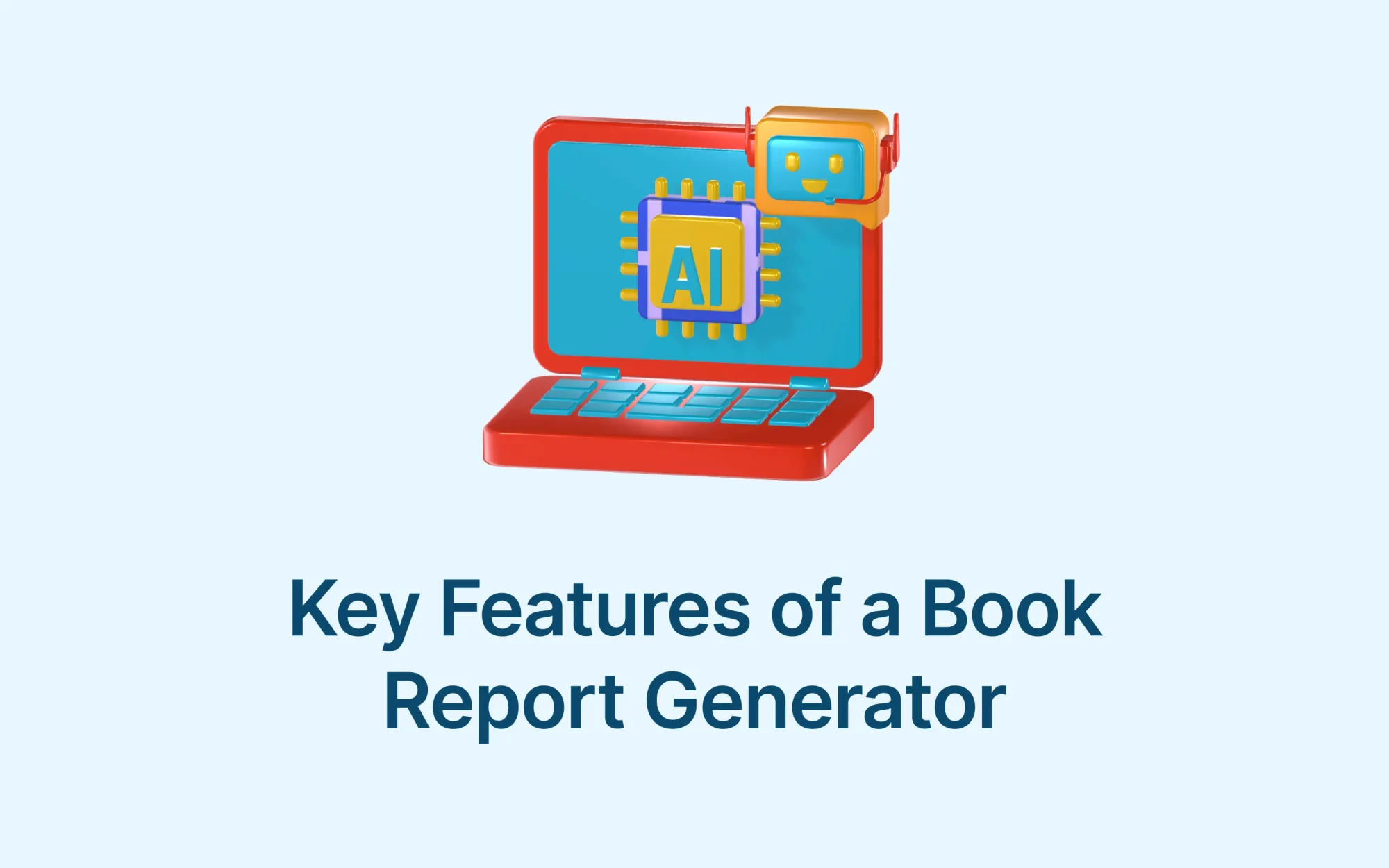
A book report generator comes with several helpful features that make writing a book report quicker and easier. Let’s break down some of the key features that can take the stress out of the process.
a. Book summary creation
One of the most useful features of a book report generator is the ability to create a book summary automatically. Instead of you having to manually write a summary of the entire book, the tool can generate a concise overview that captures the main events and plot points. This feature helps you save time and ensures that you don't miss any important details when summarizing the book.
b. Key themes extraction
Every book has important themes or messages that the author wants to convey. A book report generator can identify these key themes for you, making it easier to understand what the book is really about. Whether it's love, friendship, courage, or justice, the tool highlights these themes so you can include them in your report without having to dig through the book for clues.
c. Plot analysis automation
Breaking down the plot of a book can be tricky, especially when dealing with complex stories. With a book report generator, the plot analysis is automated. This means the tool will help you outline the major events, conflicts, and resolutions in the story. It guides you through the beginning, middle, and end of the plot, showing how everything ties together.
d. Character development insights
Understanding how characters change and grow throughout a story is an important part of any book report. A book report generator provides insights into the main characters' development, explaining how they evolve from the start to the end of the book. This feature helps you identify the strengths, weaknesses, and motivations of the characters, making your report more insightful.
e. Setting description generator
The setting of a book—the time and place where the story happens—is often crucial to understanding the story. A book report generator can automatically describe the setting for you, giving a detailed picture of where the action takes place. Whether it's a historical setting or a futuristic world, this feature helps you include an accurate setting description in your report without spending extra time figuring it out.
How Does a Book Report Generator Work?
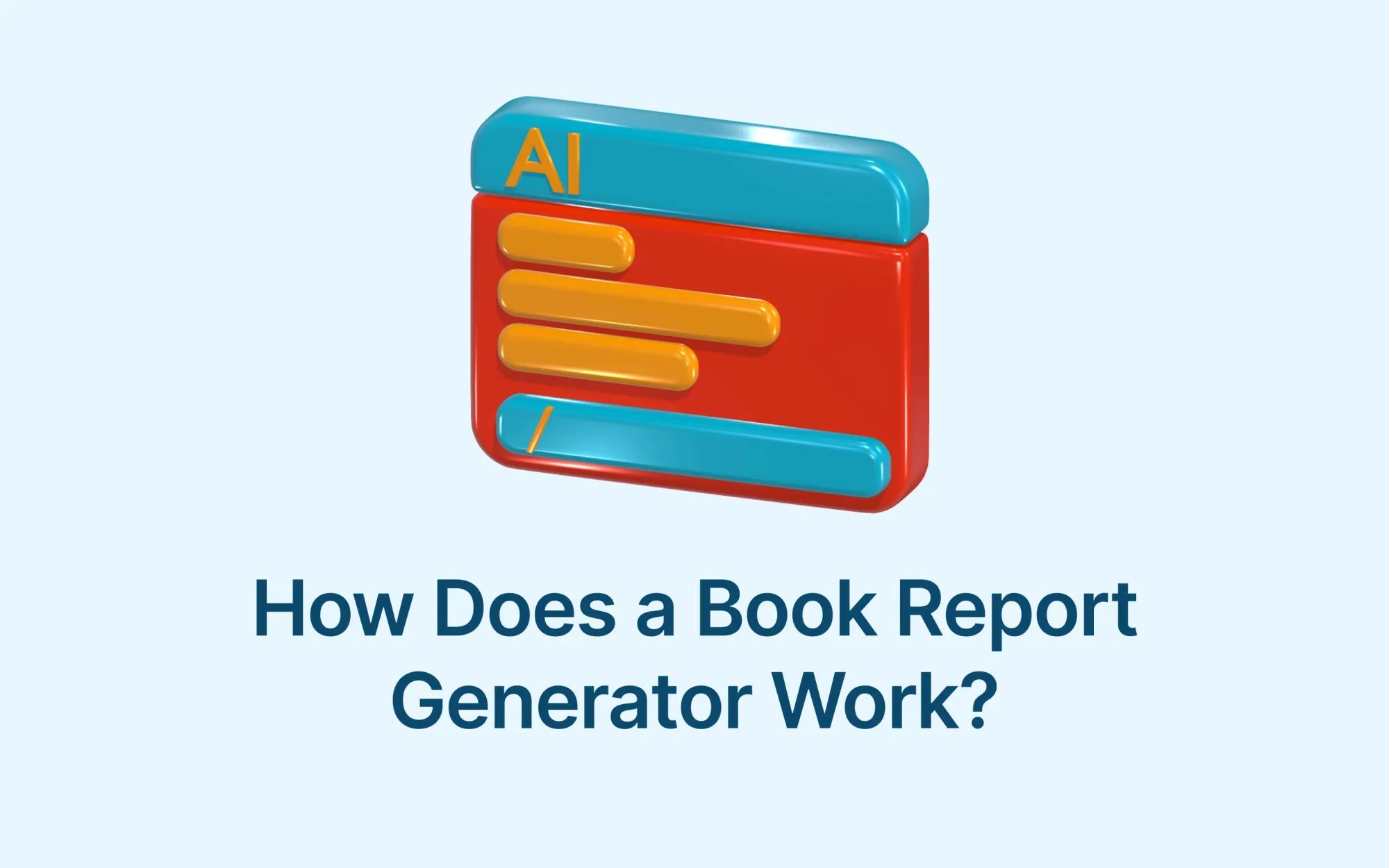
Using a book report generator is simple and straightforward. It guides you step by step to create a complete book report without the hassle. Here’s how it works:
Step-by-Step Process of Inputting a Book
- Enter Book Information: The first step is to provide the tool with some basic information about the book. You might need to enter details like the book title, author’s name, and possibly the genre. This helps the tool understand what kind of book you are working with.
- Answer Simple Questions: Once the basic details are in, the generator might ask you a few easy questions about the book. For example, it might ask what the main plot is, who the main characters are, and what themes stood out to you. You can type in short answers based on what you remember from the book.
- Upload Text (Optional): Some advanced book report generators allow you to upload the text of the book, which lets the tool analyze the content in more detail. This can be handy if you want the generator to automatically pick out important parts of the book.
Importance of Including Key Themes and Literary Devices
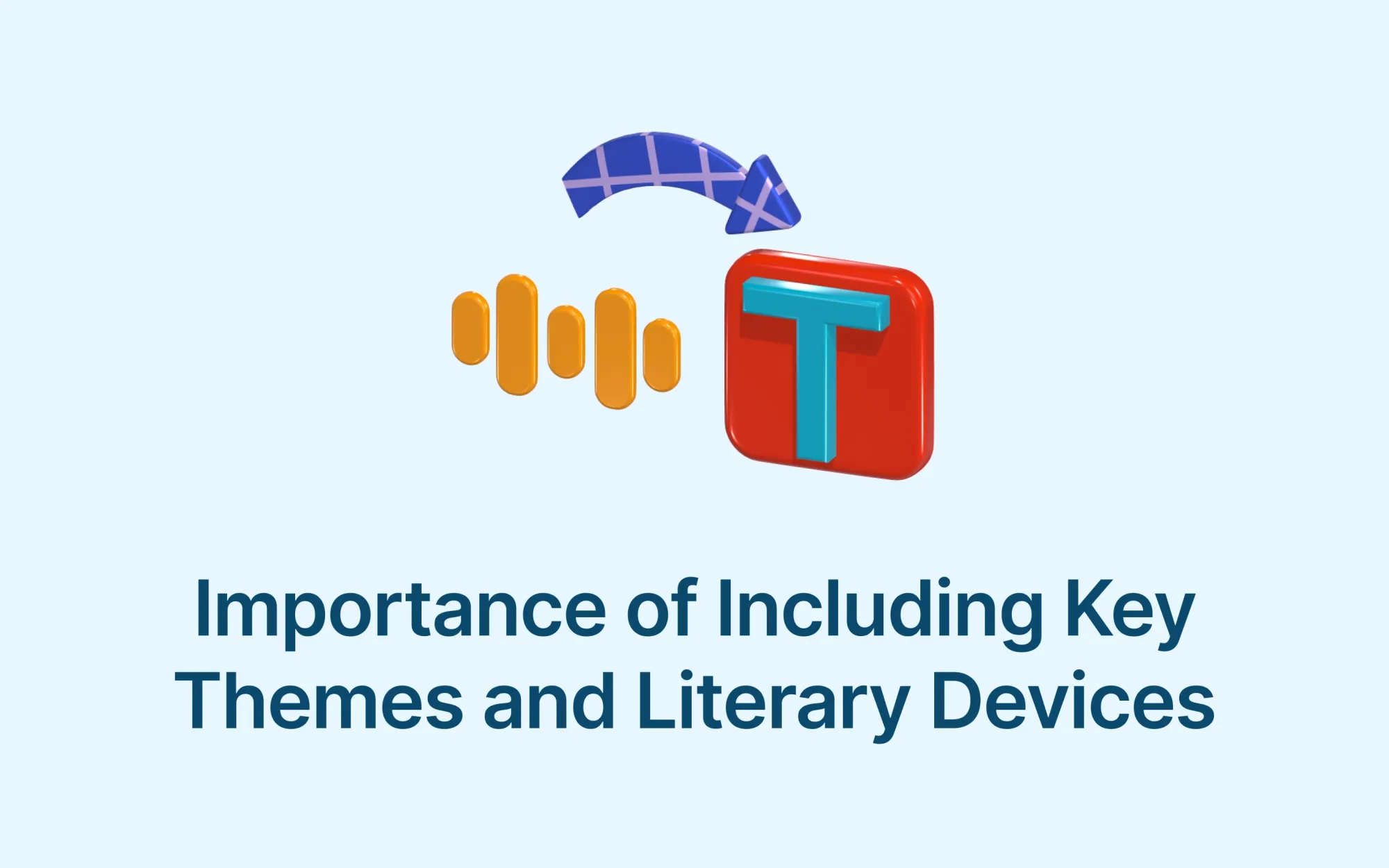
When writing a book report, it’s not just about summarizing the plot or listing the characters. Understanding the key themes and literary devices used in the book is essential to fully grasping the author’s message. Let's break down why these elements matter and how a book report generator helps you include them in your report.
Why Understanding Key Themes is Important
Key themes are the central ideas or messages that run throughout the book. They’re what the author wants readers to think about or learn from the story. Understanding these themes helps you appreciate what the book is really about beyond just the events that happen in it. For example:
- In a book about friendship, the theme might explore how relationships help characters overcome challenges.
- In a dystopian novel, the theme could be about power, control, or survival.
By identifying the key themes, you can show that you understand the deeper meaning of the book, not just the surface-level details.
Including key themes in your book report demonstrates that you've read the book carefully and understood its message. Teachers and readers are often more interested in what the book teaches or communicates rather than just a summary of what happened.
The Role of Tone, Mood, and Setting in Book Reports
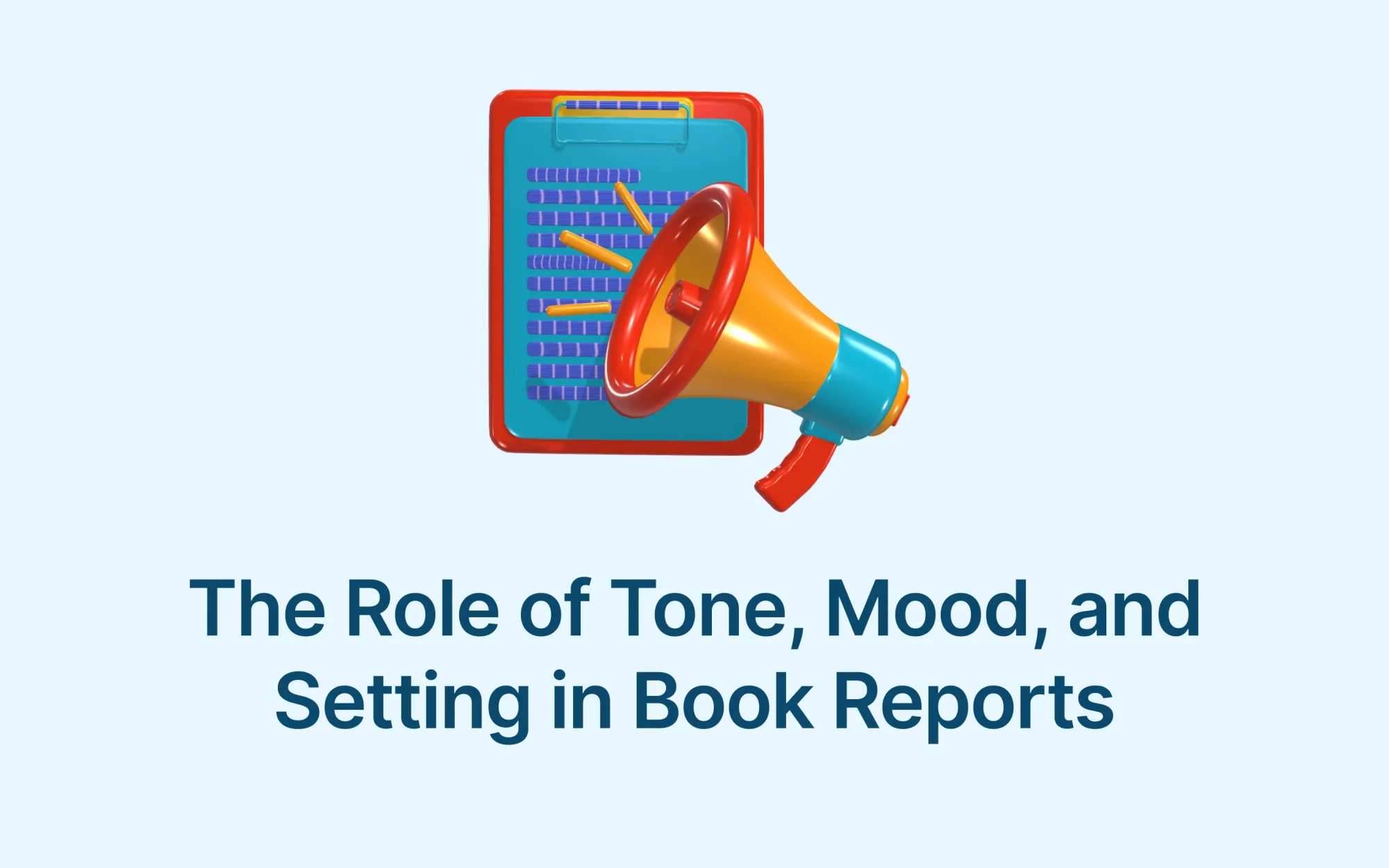
When writing a book report, it’s important to go beyond just the plot and characters. Understanding the tone, mood, and setting of the book can give you a deeper appreciation of the story and how it’s told. These elements play a big role in shaping the reader's experience and understanding of the book. Let’s break down why they matter and how a book report generator helps you include them in your report.
Importance of Analyzing Tone and Mood
Tone refers to the author's attitude toward the subject or characters in the book. It’s how the author feels about what they’re writing. The tone could be serious, humorous, sarcastic, or even sad, depending on the situation in the story.
For example:
- If the author uses a serious tone, it could indicate that the subject is important or tragic.
- A humorous tone might suggest that the author wants to keep things light and entertaining, even if the plot is complicated.
Understanding the tone helps you see how the author’s attitude shapes the way the story is told. Including this in your book report shows that you’re paying attention not just to what happens, but to how the author communicates it.
Mood, on the other hand, is the overall feeling or atmosphere the reader experiences while reading the book. This could be anything from suspenseful to joyful to eerie. The mood affects how the reader feels about the story, making it an essential part of your analysis.
For example:
- A suspenseful mood might make the reader feel anxious or excited, waiting for what happens next.
- A peaceful or happy mood could make the reader feel calm and satisfied as the story unfolds.
By analyzing the mood, you can explain how the book makes you feel and how the author creates that emotional experience.
Describing the Setting’s Impact on the Story
Setting refers to where and when the story takes place. It includes the time period, location, and environment in which the events of the book unfold. The setting can greatly influence the plot, characters, and mood of the story.
For example:
- If the story is set in a war-torn country, the setting can create a tense and dangerous atmosphere, shaping how characters behave and how events unfold.
- A story set in a small, quiet town might focus more on personal relationships and everyday life, giving it a calmer, more intimate feel.
The setting also helps readers understand the context of the story. If the book is set in the past, for instance, characters might face challenges related to that time period, like outdated technology or social norms. Describing the setting in your book report shows that you understand how the time and place influence the story’s events and characters.
Critical Evaluation and Personal Reflection
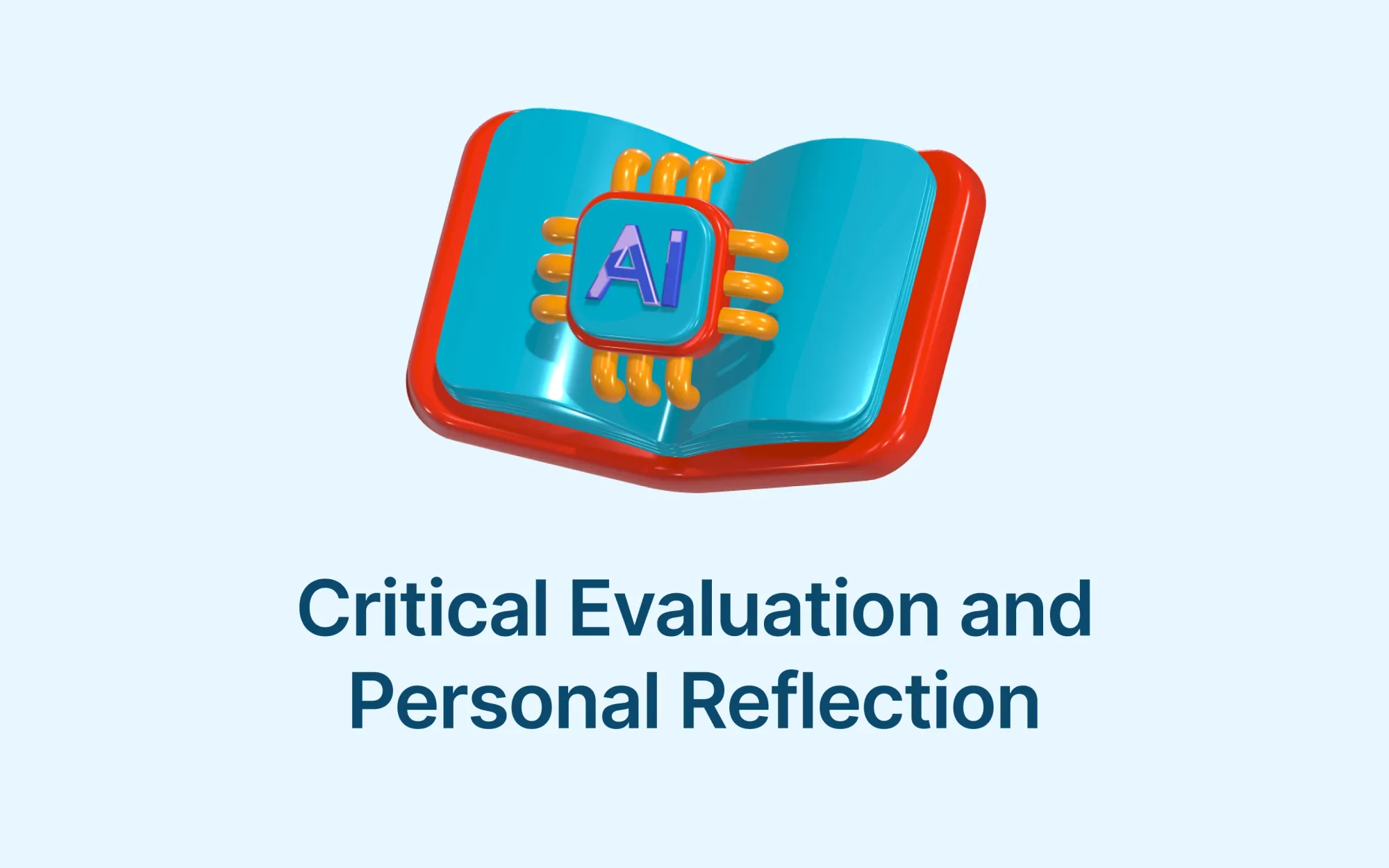
Writing a book report isn’t just about summarizing what happened in the story—it’s also a chance to share your personal thoughts and critically evaluate the book. This section of your report is where you can dig deeper and express what you truly think about the book and its impact on you. Let’s explore why personal reflection and critical thinking are so important and how a book report generator helps you include them in your report.
The Importance of Personal Reflections and Critical Thinking
Personal reflection is all about sharing your own thoughts and feelings about the book. This is your opportunity to go beyond the facts of the story and explore how it affected you personally. For example:
- Did the book make you think differently about a particular topic?
- Were there characters you could relate to, or did some events surprise you?
When you include personal reflections in your report, it shows that you’ve really thought about what you’ve read. Your teacher or audience wants to see how the book impacted you and what you took away from it.
Critical thinking involves analyzing the book on a deeper level. It’s about asking questions like:
- What are the strengths and weaknesses of the book?
- Did the author achieve their goals?
- What parts of the story worked well, and what could have been improved?
By thinking critically, you can offer a more well-rounded view of the book, showing that you’re not just passively reading but actively engaging with the material.
Conclusion
In conclusion, a book report is more than just retelling the story—it’s about understanding the key themes, analyzing the characters, and sharing your own thoughts and opinions. A book report generator is a great tool to help make this process easier and faster. It automatically creates summaries, identifies important themes, and helps you think about things like tone, mood, and setting.
But it also gives you space to include your own personal reflections and critical thoughts, which make your report unique and thoughtful. By using a book report generator, you can save time while still writing a detailed, well-rounded report that shows your understanding and insights into the book.
Frequently Asked Questions
1. What is a book report generator?
A book report generator is a tool that helps you create a book report by summarizing key points, themes, and details about a book automatically.
2. How does a book report generator work?
It works by analyzing the text of a book or input provided by you, then generating a report based on the book's plot, characters, and main ideas.
3. Can I use a book report generator for any book?
Yes, most book report generators can handle a wide range of books, but it’s best to check if it supports the specific book or genre you’re working with.
4. Are the reports from a book report generator accurate?
They generally provide a good overview, but it’s a good idea to review and edit the report to ensure it meets your needs and includes any additional insights you want to add.
5. Do I need to pay for a book report generator?
Some book report generators are free, while others may require a subscription or one-time payment. Check the tool’s website for details on pricing.



